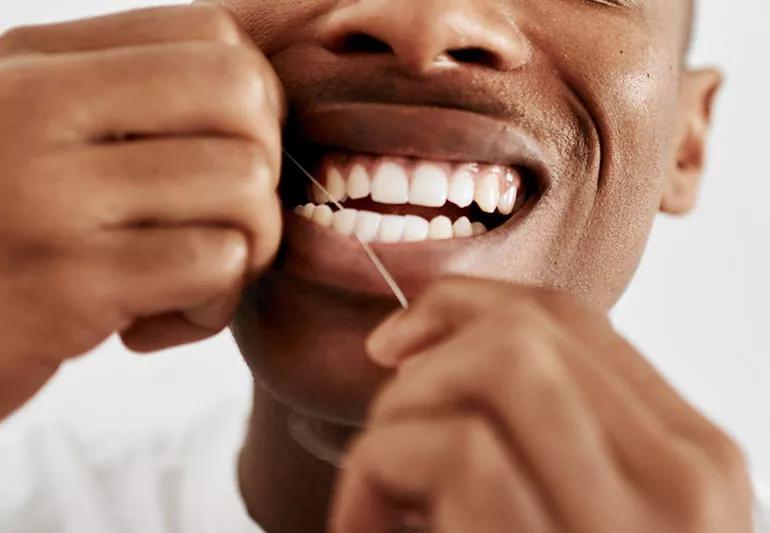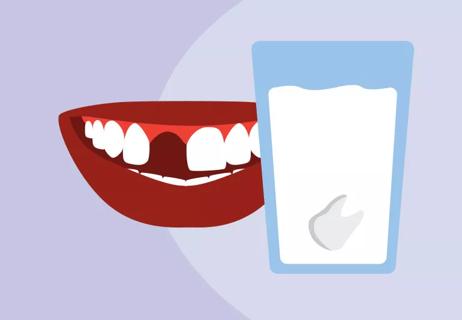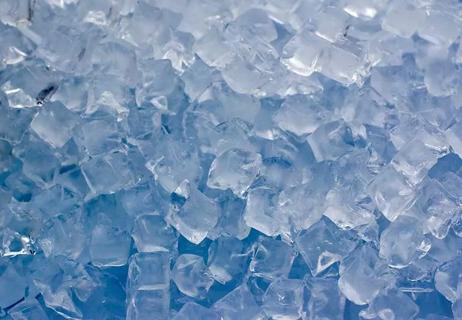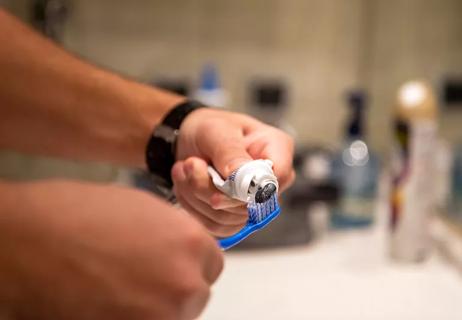No, oil pulling and vitamin D won’t fill or fix a cavity

From a very young age, your dentist will remind you that proper teeth health begins with regular brushing and flossing. Unfortunately, despite your best intentions, chances are you’ll develop a cavity at some point in your life. According to the U.S. Centers for Disease Control and Prevention (CDC), 90% of adults age 20 and older have had at least one cavity.
Advertisement
Cleveland Clinic is a non-profit academic medical center. Advertising on our site helps support our mission. We do not endorse non-Cleveland Clinic products or services. Policy
Tooth decay isn’t the end of the world, but it’s something you need to have taken care of by your dentist without delay. Anne Clemons, DMD, explains the best ways to keep your teeth in tip-top shape and why home remedies for cavities don’t exist.
The short answer: No, and removing a cavity at home isn’t recommended. In fact, it’s not even possible, especially if the decay has advanced past the hard, outer enamel shell of your tooth into the softer dentin below it.
You can think of a cavity’s progression almost like Pac-Man munching on power pellets. “The more that bacteria eat sugars and carbohydrates, the more they secrete acid and break down your tooth,” says Dr. Clemons. “The bigger the cavity gets, the more likely you are to need a filling. If the cavity approaches the pulp chamber, root canal therapy may be needed.”
She continues, “If you have a dental cavity that is large enough that it’s extending into the dentin, the inner surface of the tooth, you can’t get rid of that.
“Additionally, the cavity progresses faster in that tooth surface, so you don’t want to wait to see your dentist to get treatment.
But Dr. Clemons also says if a cavity is “small and barely into the enamel on your tooth” — something known as a “watch” or what dentists call “incipient caries” — you can take steps to prevent it from getting bigger.
Advertisement
“If it’s in between your teeth, dentists will recommend you keep up with your flossing, brush with toothpaste that has fluoride in it, and potentially use a mouth rinse with fluoride in it to strengthen the enamel and prevent that cavity from getting larger,” she explains. “But once the cavity is bigger than a watch-type lesion, it’s harder to maintain it at that size. It’s likely going to progress with time.”
For older adults that have a lot of dental cavities — especially around their crowns — or little kids who have baby teeth due to fall out soon, Dr. Clemons says dentists occasionally use silver diamine fluoride (SDF).
“It arrests the cavity,” she continues. “The downside of this is that it turns a tooth really black, and so it’s not very aesthetically pleasing. That’s why we reserve it for only certain uses. It’s also not great for larger, or certain locations of cavities, because we can’t get fully into the space, especially between teeth.”
Peruse the internet and you’ll find plenty of people who claim they know how to get rid of a cavity at home. Unfortunately, Dr. Clemons says the methods they suggest don’t work.
Although oil pulling — or swishing coconut oil around in your mouth — isn’t harmful, you won’t get cavity relief from it. “It’s not going to be beneficial,” states Dr. Clemons. “A cavity is a hole in your tooth. You can’t fill that by swishing coconut oil or using a DIY method you find on the internet.”
When you’re a kid, getting proper amounts of calcium and vitamin D is key to keeping your bones strong and growing. As an adult, taking supplemental vitamins won’t necessarily help your teeth. “While your tooth is like a bone, it’s not the exact same makeup as a bone,” Dr. Clemons explains. “Plus, your teeth develop when you’re really young. As an adult, they’re fully formed. They’re not going to grow or develop anymore. We can’t rely on vitamins or supplements to strengthen teeth or fight cavities.”
Sugar-free gum won’t help you get rid of a cavity, but it does provide other benefits — including keeping you away from snacking and carbs. “If you’re a person that snacks and you need to have something in your mouth, sugar-free gum is a good alternative because you won’t have any carbohydrates and sugars in your mouth,” she suggests.
In addition to daily brushing and flossing, Dr. Clemons offers these tips for healthier teeth:
“When we have a patient that has a lot of dental cavities, we talk about the frequency of their meals,” she says. “If a patient has snacks or drinks (that aren’t water) frequently throughout the day, then all day long the bacteria can use those carbohydrates and acids to create cavities.” As a good rule of thumb, stick to three meals a day, and try to limit snacks.
Advertisement
If you do tend to have an afternoon snack, make sure to brush your teeth very soon after you’re done. “What you want to do is get rid of the food source for bacteria to consume,” Dr. Clemons notes. “You want to return your mouth to a neutral pH, rather than an acidic pH, which the bacteria thrive in and produce more acid.”
In addition to preventing you from snacking, sugar-free gum stimulates your saliva flow. “Saliva protects your teeth from dental cavities forming,” Dr. Clemons says. “It has a more neutral pH, and cavity-producing bacteria are more active in an acidic environment.”
Swishing some mouthwash around in your mouth and calling it a day isn’t a foolproof way to prevent cavities. Instead, you need to make sure to remove all of the food and any plaque that’s built up between your teeth.
“Mouthwash can be a helpful addition for some patients, but it is no substitute for cleaning the teeth with a brush and floss,” Dr. Clemons points out. “Mouthwash can’t do the job of physically removing the plaque and bacteria.”
If you sense you may be developing a cavity, it’s better to see a dentist sooner rather than later. Letting cavities progress could lead to bigger problems down the line.
Advertisement
“It may get to the point where one day you have so much pain that you’re not sleeping at night, and it’s radiating throughout your jaw,” Dr. Clemons says. “And then, likely this cavity has reached the pulp of the tooth, where the nerve and the blood supply are. It’s can be painful. And usually, that’s when a dentist gets a phone call and needs to be seen right away to either have a root canal done or have the tooth extracted.”
Your best way to avoid a moment such as this is to see your dentist twice a year for checkups, brush at least twice a day, floss daily, and try Dr. Clemons’ tips for healthy teeth.
Advertisement
Learn more about our editorial process.
Advertisement

Start weaning your toddler off daytime pacifier use by 12 months old to help prevent dental issues and speech delays

At-home products like whitening toothpaste, rinses and strips can bring bright results

Keep the nail file out of your mouth and leave any tooth shaving up to your dentist

Help and encourage them to brush and floss regularly, limit sugary foods and get routine dental checkups

Act quickly to increase the chances that your tooth can be saved

You can do damage to fillings, crowns and even your teeth themselves

Cavities, grinding or even a sinus infection could be behind your tooth pain

How your teeth and gums can alert dentists to other health problems

Wearing a scarf, adjusting your outdoor activities and following your asthma treatment plan can help limit breathing problems

Your diet in the weeks, days and hours ahead of your race can power you to the finish line

When someone guilt trips you, they’re using emotionally manipulative behavior to try to get you to act a certain way